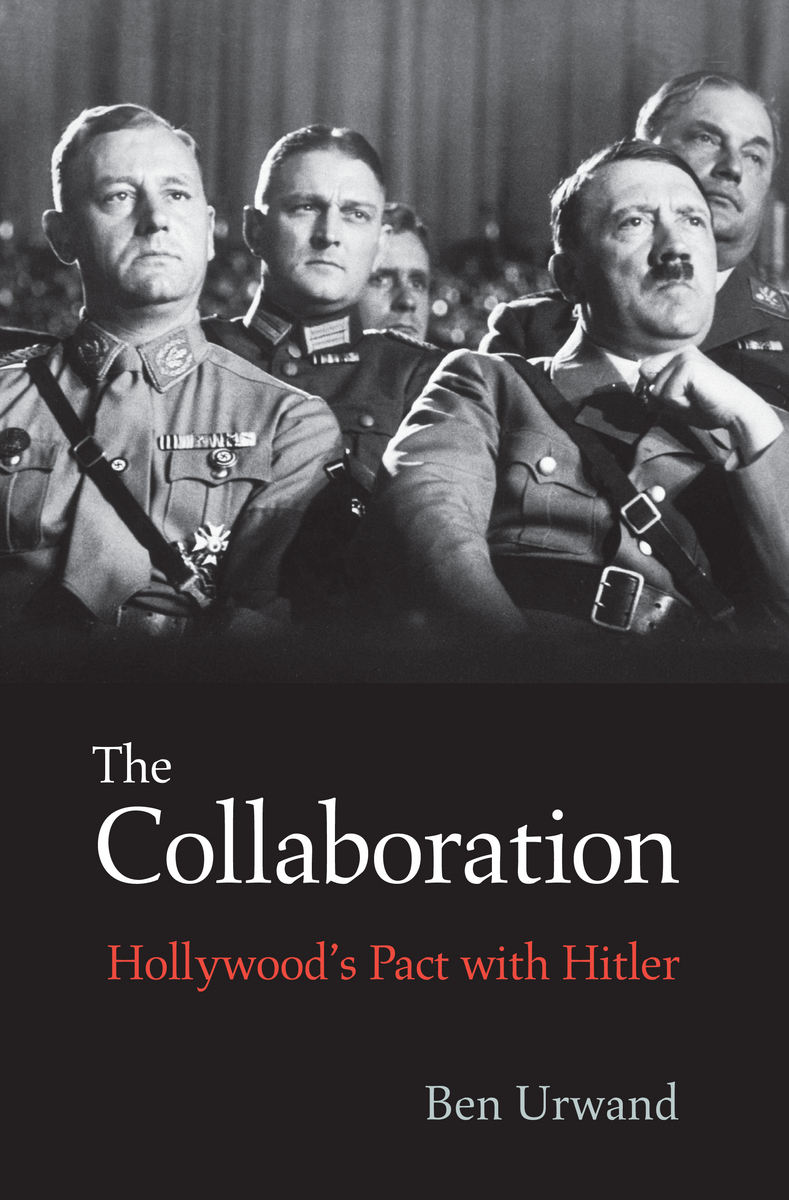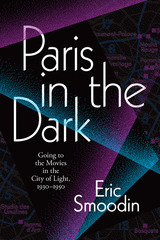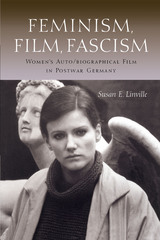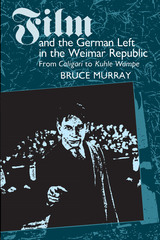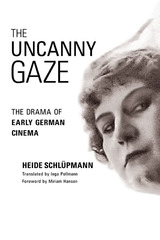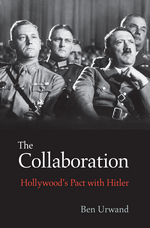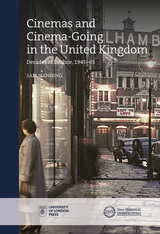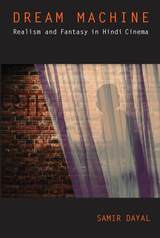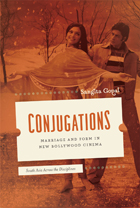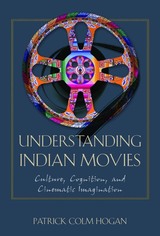Urwand draws on a wealth of previously uncited documents to argue that Hollywood studios, in an effort to protect the German market for their movies, not only acquiesced to Nazi censorship but also actively and enthusiastically cooperated with that regime’s global propaganda effort.
-- Jennifer Schuessler New York Times
[An] eye-opening study of Hollywood and the Nazi elite… The Collaboration unfolds a story that rather knocks the shine off the golden age of cinema… Urwand has done some energetic digging in the archives, quoting letters, memos and newspaper reports to uncover a shameful policy of compromise and kowtowing on the part of the studio bosses. And what lends the story its peculiar irony is that those bosses who did their utmost to appease the crazed ideology of Nazism were by and large Jews themselves.
-- Anthony Quinn The Guardian
Urwand…sheds new light on the way the studio bosses responded to Nazi pressure, from 1933, when Hitler assumed power, to 1941, when the United States entered the war… Drawing on American and German archival material, the author shows that Hollywood began working with the Nazis in 1933. The collaboration was not passive, but voluntary: part of a strategy necessary in order for the studios to maintain their market in Germany—which had more movie theaters than any other country in Europe… Urwand describes how the Nazis tried to shape the very content of American films—and often succeeded.
-- Samuel Blumenfeld Le Monde
Urwand’s book uncovers important material about the relationship between the American film industry and the Nazi regime… Readers may or may not agree with Urwand’s conclusion about the perils of Jewish self-denial. But in highlighting it, he provides a useful reminder that scholarship on the Nazi era continues to serve as a mirror in which Jews view themselves.
-- Gavriel Rosemfeld Forward
Urwand…presents explosive new evidence about the shocking extent of the partnership between the Nazis and major Hollywood producers… [A] riveting book… As you turn its pages you realize with dismay that collaboration is the only fitting word for the relationship between Hitler and Hollywood in the 1930s. Using new archival discoveries, Urwand alleges that some of the Hollywood studio heads, nearly all of whom were Jewish, cast their lot with Hitler almost from the moment he took power, and that they did so eagerly—not reluctantly. What they wanted was access to German audiences. What Hitler wanted was the ability to shape the content of Hollywood movies—and he got it… What is shocking and new about Urwand’s account is its blow-by-blow description of Hollywood executives tailoring their product to meet the demands of the Nazi regime.
-- David Mikics Tablet Magazine
Hard-hitting… Urwand has dug deep…and come up with some genuine revelations… The story is quite dramatic, and shameful.
-- Philip Kemp Times Higher Education
Urwand’s book about how Hollywood conducted business with and within Germany after Hitler’s ascent to power is a fascinating examination of capitalist amorality in the face of evil. Urwand does a good job of cataloging the ways Hollywood studios—largely headed by immigrant Jewish entrepreneurs—took measures to placate the Nazis so they could continue to show films in Germany throughout the 1930s, until the Nazi invasion of Poland… Urwand has uncovered a very interesting, heretofore unknown, true Hollywood story.
-- Philip Martin Arkansas Democrat-Gazette
[A] provocative book.
-- Rosemary Neill The Australian
The Collaboration expertly dismantles Hollywood’s rose-tinted view of history, proving it wasn’t standing up to fascism as it has claimed, but eagerly appeasing the Nazis so long as the money was coming in.
-- Kyle Ryan A.V. Club
[The] revelations in Ben Urwand’s controversial exposé, The Collaboration, are nothing short of astonishing, going well beyond what was known about Hollywood’s timidity during that era. With damning archival evidence, Urwand argues that the studios, motivated by profits, were reluctant to abandon the German market, where American films were popular and Hitler himself was a fan… Urwand’s finely documented account is even more chilling—in large part because the ‘collaborators’ to whom he points were American, and in many cases also Jewish.
-- Julia M. Klein Boston Globe
[Urwand] has revealed in terrifying detail how Hollywood was at the whim of the Nazis throughout the 1930s—censoring films and dropping others in a sinister collaboration with Hitler.
-- Daily Mail
Impeccably researched and impressively argued, Ben Urwand’s gripping volume systematically reveals the way major Hollywood studios were willing to protect their financial interests in the German market by appeasing the Nazi regime. Urwand has unearthed remarkable evidence from archives in Germany and America, confirming that the road to hell was paved with a thousand concessions. Hollywood studios went to astonishing lengths not to offend or upset the Nazi regime. What began with minor adjustments to scripts eventually reached a point where projects that were unsympathetic to Germany’s past or critical of the Nazis were simply never made… The studios didn’t just follow a policy of accommodation they became willing partners with the Nazis to reach an understanding of what could be mutually beneficial to both parties. The book is such a revelation because it goes against the grain of commonly held assumptions… Urwand is particularly good at marshalling hard facts and solid evidence that builds into a horrifying indictment of studios that continued to operate in Germany throughout the first eight years of Hitler’s rule… Even as the full horrors of the Nazi regime became apparent to the world, Hollywood continued to offer the hand of collaboration, a fact all the more ironic considering that many of the studio bosses were Jewish… This is a book that challenges every rose-tinted view of Hollywood’s Golden Age. It sheds a piercing light on dark deeds and is an invaluable work of political history that has all the page-turning urgency of a thriller.
-- Allan Hunter Herald (Scotland)
The Collaboration felt genuinely original and eye-opening as Ben Urwand systematically revealed the way major Hollywood studios were willing to protect their financial interest in the German market of the 1930s by appeasing the Nazi regime. The road to hell was paved by a thousand concessions.
-- Allan Hunter Herald (Scotland)
The book is a fascinating take on the shady politics of Hollywood and should be read by anyone interested in going behind the glamour of 1930s cinema.
-- Taylor Downing History Today
Urwand has dug deep in the German archives and found evidence that the Nazis’ business dealings with some of the studios were much closer than previously realized. He also draws attention to the flagrant lobbying of the Nazi emissary to Hollywood.
-- J. Hoberman London Review of Books
Urwand’s investigation of this dark chapter in the history of the American film industry is as intriguing as it is compellingly told.
-- Theis Duelund Los Angeles magazine
Urwand’s book details in sometimes shocking fashion how the Hollywood film industry, including studios run by legendary Jewish film moguls such as Louis B. Mayer, were willing to pre-screen their films for Nazi officials and remove content they found objectionable.
-- Andy Goldberg Military.com
In Urwand’s account of the relationship between the American film industry and the government of Germany in the 1930s, he shows that Hollywood studios put profits ahead of scruples in their dealings with the Nazis.
-- Lisa Jarvinen Philadelphia Inquirer
Urwand is tearing down the popular impression that the 1930s Hollywood community stood united in efforts to combat the Nazi regime. Quite the contrary, says Urwand, whose research reveals a shocking level of collaboration (or Zusammenarbeit, i.e. ‘working together’) between the German government and Tinseltown’s studios—many of which were famously headed by Jews… The Collaboration depicts a studio system in which films were submitted for approval to aggressive German propaganda officials, who demanded cuts and changes to material deemed ‘detrimental to German prestige’—not only to film versions created for the German market, but for the U.S. and countries around the world.
-- Lesley M. M. Blume Vanity Fair online
With great attention to detail, Urwand describes multiple contacts between the studios and German officials, and he apparently breaks some new ground with his descriptions of Georg Gyssling, who became a Hollywood fixture after Hitler came to power in 1933.
-- Roger Currie Winnipeg Free Press
A welcome addition to understanding Hollywood’s response to the rise of Nazism.
-- J. Fischel Choice
Offers a keen, unsettling look at the unholy alliance Hollywood made with the Nazis, which allowed both to keep packing movie theaters in Germany up until the outbreak of war… There was pressure on the studios to censor defense of Jews in certain films and suppress films that portrayed Nazis in an unflattering light (The Mad Dog of Europe). The result of this complicated and slippery relationship, as Urwand depicts with subtlety, was the absolute disappearance from film of Nazis and Jews until the end of the decade.
-- Kirkus Reviews
This eminently accessible, often riveting account of a little-understood chapter in American cinema history should appeal to a wide general readership.
-- Roy Liebman Library Journal
Urwand keeps the jaw-dropping revelations coming in this damning indictment of the complicity of the major Hollywood studios—and their mostly Jewish heads—in the Nazis’ campaign to exterminate Europe’s Jews… Urwand deserves immense credit for this groundbreaking—and truly unique—take on the WWII era.
-- Publishers Weekly (starred review)
A tremendous piece of work, fully sustained, building momentum charged by thrillingly detailed storytelling, increasing suspense, and a consistent movement from outrages to atrocities, with a stunning conclusion of heroism and tragedy—and it is as well a devastating RIP to what we’ve been told, all down these years, about ‘the genius of the system.’
-- Greil Marcus
Full of startling and surprising revelations, presented in exemplary fashion, without any moralizing or sensationalism. The Collaboration shows how Hollywood and especially the big studios went along with German demands to censor movies not only before but especially after the Nazi seizure of power.
-- Richard J. Evans
